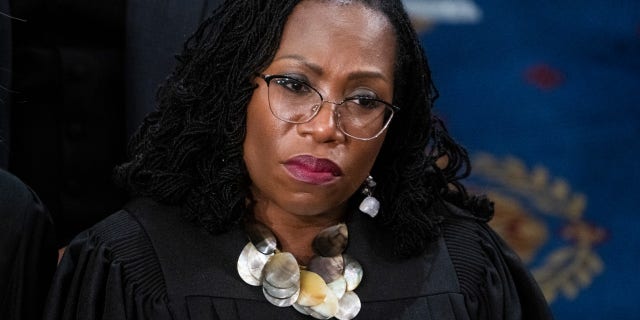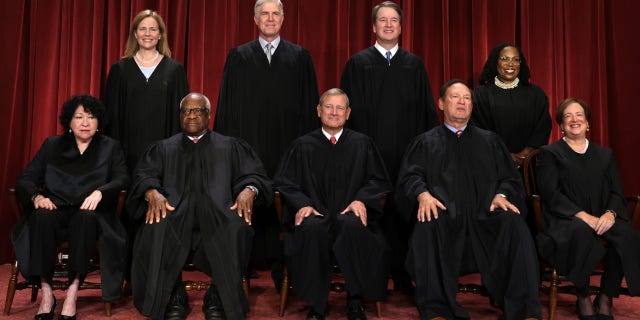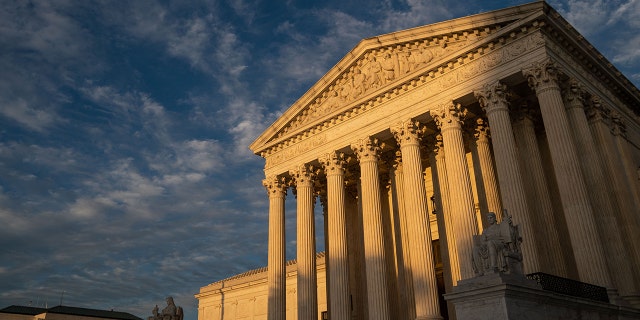

In her dissent, Jackson criticized the court's application of Munsingwear vacatur, a legal doctrine that addresses what should happen to a court decision when the appealed case becomes moot while it is pending review by a higher court. The doctrine says such decisions should be vacated, with an important exception for cases where the party adversely affected by the vacated decision was not responsible for rendering the case moot.
"I am concerned that contemporary practice related to so called ‘Munsingwear vacaturs’ has drifted away from the doctrine's foundational moorings," Jackson wrote in her dissent.

Supreme Court Justice Ketanji Brown Jackson issued a lone dissent after the Supreme Court vacated a lower court decision in an abortion case. (Tom Williams/CQ-Roll Call, Inc via Getty Images)
This case stemmed from a lawsuit in Missouri alleging that court clerk Michelle Chapman violated a 17-year-old pregnant teenager's rights. Missouri law requires a pregnant minor to obtain permission from her parents to have an abortion. In certain circumstances, the law allows a minor to get court permission to bypass parental consent.
When the teenager, referred to as Jane Doe, went to court in 2018 seeking permission to get an abortion, Chapman told her the court would have to notify her parents about the hearing. Doe instead traveled to Illinois, where she obtained court permission and later had an abortion.
Chapman claimed immunity from the suit, but both a federal district court in Missouri and the U.S. Court of Appeals for the 8th Circuit rejected her claim. However, the Supreme Court vacated the 8th Circuit's decision, agreeing with Chapman that the ruling should have been thrown out because the case was made moot by the Supreme Court's decision in Dobbs vs. Jackson Women's Health Organization, which overturned Roe v. Wade and ended the constitutional right to an abortion.
CRUZ TO INTRODUCE CONSTITUTIONAL AMENDMENT TO PREVENT DEMOCRATS FROM PACKING SUPREME COURT

United States Supreme Court (front row L-R) Associate Justice Sonia Sotomayor, Associate Justice Clarence Thomas, Chief Justice of the United States John Roberts, Associate Justice Samuel Alito, and Associate Justice Elena Kagan, (back row L-R) Associate Justice Amy Coney Barrett, Associate Justice Neil Gorsuch, Associate Justice Brett Kavanaugh and Associate Justice Ketanji Brown Jackson pose for their official portrait at the East Conference Room of the Supreme Court building on Oct. 7, 2022, in Washington, D.C. (Alex Wong/Getty Images)
In her dissent, Jackson argued that Munsingwear vacatur should only be extended to "extraordinary" or "exceptional" cases. She wrote that this case became moot when Chapman and the teenager agreed to have their original case in Missouri district court dismissed, asserting that "Chapman contributed to the mootness of this case insofar as she stipulated to its dismissal."
As such, Jackson said it was not unfair to deprive Chapman of her right to appeal.
"Indeed, Chapman's only argument in support of vacatur is that the Eighth Circuit's opinion was wrongly decided. But mere disagreement with the decision that one seeks to have vacated cannot suffice to warrant equitable relief under Munsingwear," Jackson wrote.
JUSTICE DEPARTMENT ASKS SUPREME COURT TO OVERTURN DOMESTIC VIOLENCE GUN RULING

The United States Supreme Court began its 2022-2023 term on Oct. 3, 2022. (Kent Nishimura / Los Angeles Times via Getty Images)
"In my view, it is crucial that we hold the line and limit the availability of Munsingwear vacateur to truly exceptional cases," she insisted, calling Chapman's case, "far-from-exceptional."
"To do otherwise risks considerable damage to first principles of appellate review," she said.
